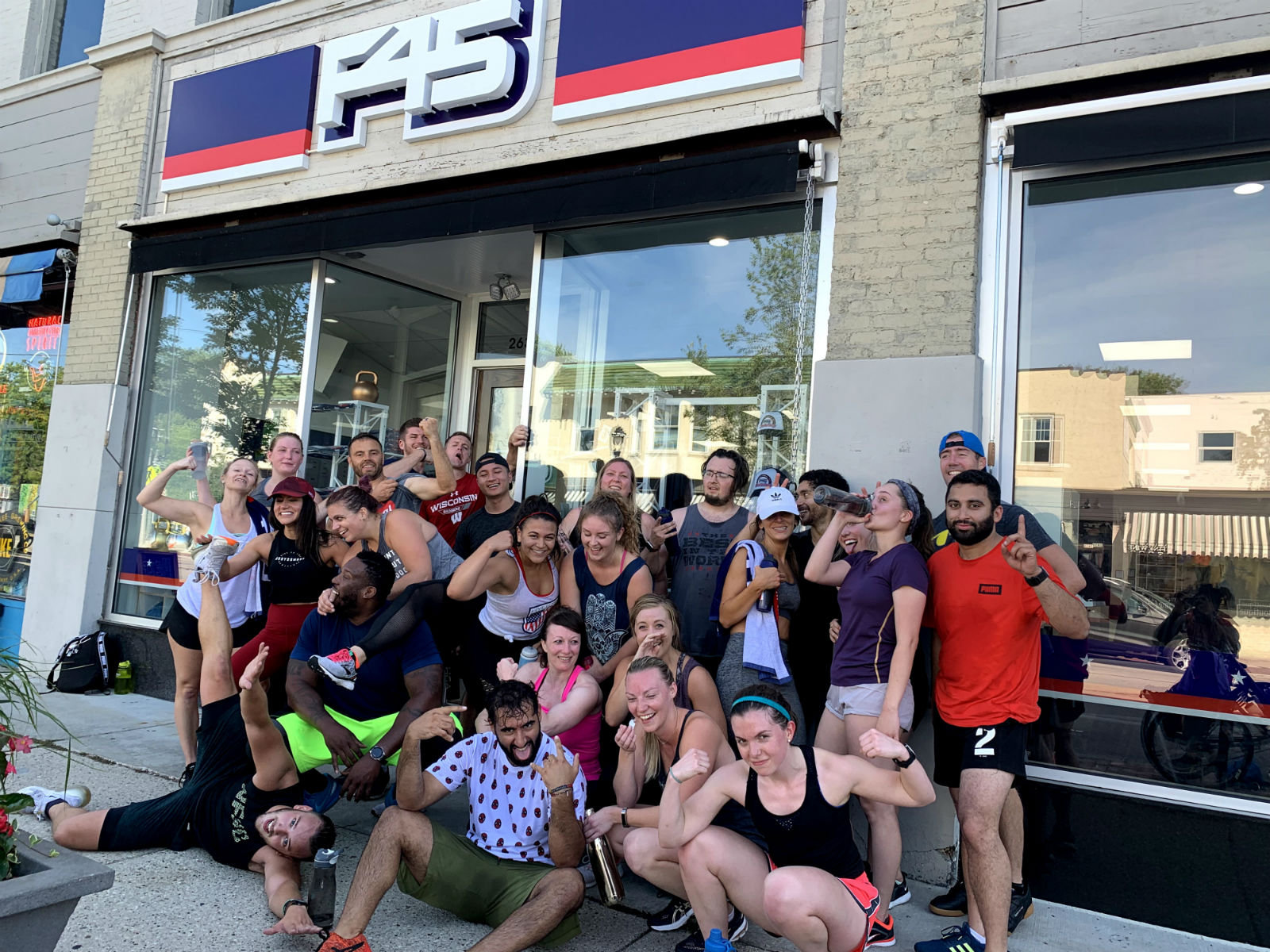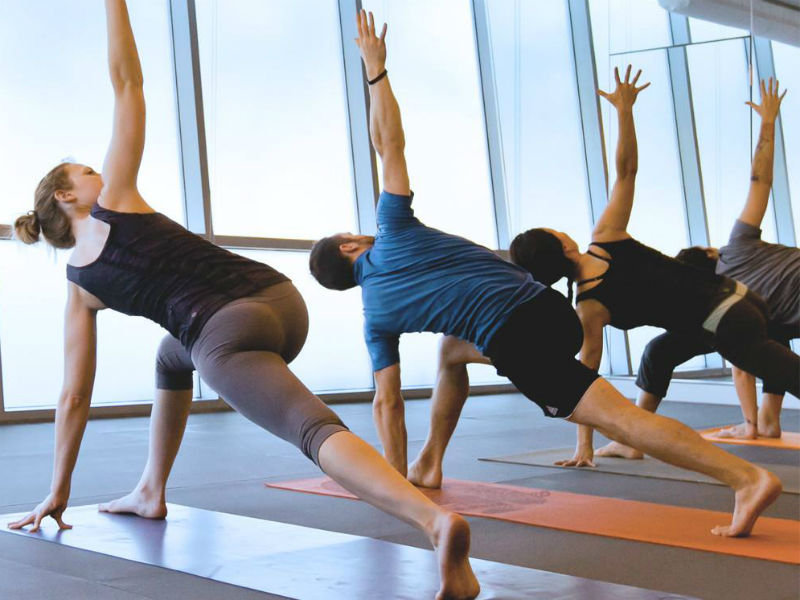New Year's celebrations are behind us, leaving only the resolutions to eat better and get fit. Don't worry, we're here to help. This week – Healthy Living Week, brought to you by The Milwaukee Y – we will focus on articles and information about exercise, eating right and staying healthy in a variety of ways.
A father of two girls who has to drop them off at daycare or school before working full-time as an engineer. A student at UW-Madison finishing up his major in dietetics while also working as a personal trainer. Another college student studying business and marketing – with a potential minor in entrepreneurship – at Winthrop University in South Carolina.
When you get to know the entire person, you realize Andre Adams, Quinn Gleisner and Kelsey Noah are, on most levels, just normal people leading normal lives, following their passions and, on some mornings, struggling to get out of bed and get over to the gym.
"We all have mornings where we don’t want to get up and don’t want to go to the gym," Gleisner joked. "I’m just an average person in that sense."
If you saw them at the gym, however, the words "normal" and "average" wouldn’t likely come to mind. See, Adams, Gleisner and Noah are competitive bodybuilders, training and forming their bodies into shape on a level that many people would typically associate with Greek gods. In Adams’ case, he’s reached the professional ranks – the first and only International Federation of Bodybuilding and Fitness (IFBB) pro men’s physique athlete and Olympian from the state.
When most people picture bodybuilding, certain images quickly pop into mind. Hulking men and women on a stage. Massive muscles and veins on top of muscles and veins. Muscle grooves and striations barely hiding under the skin. Arnold Schwarzenegger, probably.
In recent years, however, bodybuilding has changed a bit. While those competitions still certainly exist, the sport has opened itself up with several new divisions – including women’s bikini, Noah’s division, and men’s physique, Adams and Gleisner’s division. Adams, a Kenosha native, had been interested in bodybuilding since childhood, and after the "more aesthetically pleasing" men’s physique category was developed, he hopped in.
"The sport has definitely grown due to the newer divisions," Adams said. "Since I've been in the sport, it has grown exponentially in this region."
Gleisner – who Adams helps train – did, as well, looking for a new competitive outlet after his knees gave out on him and his high school/college running aspirations.
"Bodybuilding since Arnold Schwarzenegger’s days has gotten bigger and blockier," Gleisner said, "and not everybody wants to walk around at 280 pounds at 5’8". Physique athletes are muscularly developed, but they don’t have the gigantic tree-trunk quads. I think the overall aesthetic, muscular hardness and appeal is in physique. Because how many common people open up a magazine and look at a bodybuilder and think, ‘I want to look just like that’?"
In fact, according to Adams, excessive muscularity and striations are actually scored down in these divisions. Instead, elements like overall muscularity, muscle clarity, conditioning, aesthetics, symmetry, and posing and presentation take center stage in performing well in a competition.
"Your stage presence is a lot of it, how you project your attitude and your mannerisms," Gleisner explained. "We’re supposed to look like we’re not flexing … but we’re constantly flexing while we’re up there. Waving to the judges, how you interact with the crowd when they cheer for you: It’s kind of like your personality, and you don’t get to use words."
In a year’s span, athletes like Adams, Gleisner and Noah take part in about three to five competitions, limited mostly because of the constant diet adjustments it takes to get into shape for a contest – and then to get back to a more technically healthy shape.
"Although it looks really good, it’s not necessarily healthy to be walking around with the low of body fat all the time," Gleisner said.
By competing in local competitions and placing within a certain point, bodybuilders and physique athletes can qualify for national competitions, and there, one can receive their pro status – their "pro card" as it is termed – by placing at or near the top of your weight class. It’s tough competition in a very individual-focused sport, but the reality is much more supportive than one might assume.
"What I like about the sport is that it comes down to one person – it’s your effort and your work and your body – but one thing I definitely learned from Andre is that one person has a huge influence," Gleisner said. "If a person says you’re looking good and says they want to look like that and asks you questions, you have a big ripple effect, and you can make the difference in the lives of others. There’s a gigantic community to it."
Gleisner notes that communal aspect nicely counters the idea that bodybuilders and physique athletes are "egotistical meatheads," just one of the many misconceptions about the sport and those who participate in it that can present a tougher battle than anything on the stage. Adams noted that "diet, overtraining, steroids and pretty much anything else you can think of" are all common assumptions about bodybuilders that, in many cases, aren’t completely true.
"We actually eat a lot more than average people typically and more frequently," Adams explained. "Training varies widely, but on average, it's not as bad as people outside the sport may think. And not all bodybuilders take steroids. At least not all divisions I should say."
"The other one is that all we eat is chicken and fish all day long," Noah joked. "In my offseason, I eat a wide variety of food. I do choose to eat a lot more ‘clean foods’ because it makes your body feel good, but I also have my occasional pizza and what-not."
Noah – a Muskego native who decided to give the fitness world a try after heart surgery at 16 years old – faces a whole additional level of misconceptions and assumptions as a female bodybuilding competitor as well.
"The biggest misconception is that we’re very manly," she said. "Many women fear weightlifting because they immediately think that they’re going to get bulky and that they’re going to become a big, muscle-y woman. When I started, I did kind of have to have some tough skin, because I did get a lot of comments – a lot more then than I get now – about why would you want to do that and women aren’t supposed to do that. And I stuck through it, because I knew it was what I wanted to do."
Noah did note, however, that in her few years of competing, she’s seen the number of female bodybuilders increase, likely due to the growing trend toward fit and healthy lifestyles. She also said that, despite the assumptions some have, she rarely gets comments now about her body because people don’t care or notice – and if they do, they just note that she looks fit, not the feared "bulky."
It’s not just those outside perceptions, however, that bodybuilders male and female must deal with. There’s personal and emotional baggage, too. Noah noted that, in some of her early competitions, she struggled with body issues due to the constant off-season/on-season changes in her body.
"The day after a competition, you're on a high if you place well, but then, it kind of becomes, 'OK, well, what's next?'" Noah noted. "You start eating normally again, and you start gaining weight back. So seeing your body change so drastically is kind of scary and depressing, and you have to get to a place where you really love your body, and you're OK with how you look at every single stage of the process."
Then there's the sometimes intense dieting and preparation needed to perform at a high level. About 12 weeks before a competition, your diet must change and intensify; during her prep time, for example, Noah eats about five to seven meals and drinks a gallon of water a day. Then there’s the working out and the sleep needed to allow the body to rest, recoup and develop.
For Adams, a regular day includes a one-hour workout around noon, plus an additional cardio session and weak point training in the evenings, and as a show approaches, those increase.
"Keeping balance with personal life is a struggle at times," he admitted. "What we do is very strange to most people, and it limits the types of activities you can do with your friends. You are also very lethargic during prep because of the low calories, and it can take a toll on your personal life."
"When you're in prep, if you have to go to the gym, you say no to whatever you have to say no to – which really is not fun," Noah said. "I remember so many family parties or birthday parties or any event that was going to have food around it that I just plainly said no because it was too stressful for me to be around all the cake and cookies and hamburgers and hot dogs."
Even so, for Adams, Noah, Gleisner and bodybuilders over the globe, the obstacles are worth it for their rewarding sport of choice. For Noah, it’s worth feeling fit and healthy, seeing her body change in healthy ways and following a passion – one that, coincidentally, runs in her family; her father is also a bodybuilder. For Gleisner, it’s keeping his competitive spirit and vigor alive, and helping others in the process. And for Adams, who competes in professional contests around the world and whose professional status helps make him a profitable fitness brand, it's helping others, doing what he loves and one very simple reward.
"The most satisfying (part of being a bodybuilder) is easy: It’s winning."
As much as it is a gigantic cliché to say that one has always had a passion for film, Matt Mueller has always had a passion for film. Whether it was bringing in the latest movie reviews for his first grade show-and-tell or writing film reviews for the St. Norbert College Times as a high school student, Matt is way too obsessed with movies for his own good.
When he's not writing about the latest blockbuster or talking much too glowingly about "Piranha 3D," Matt can probably be found watching literally any sport (minus cricket) or working at - get this - a local movie theater. Or watching a movie. Yeah, he's probably watching a movie.







